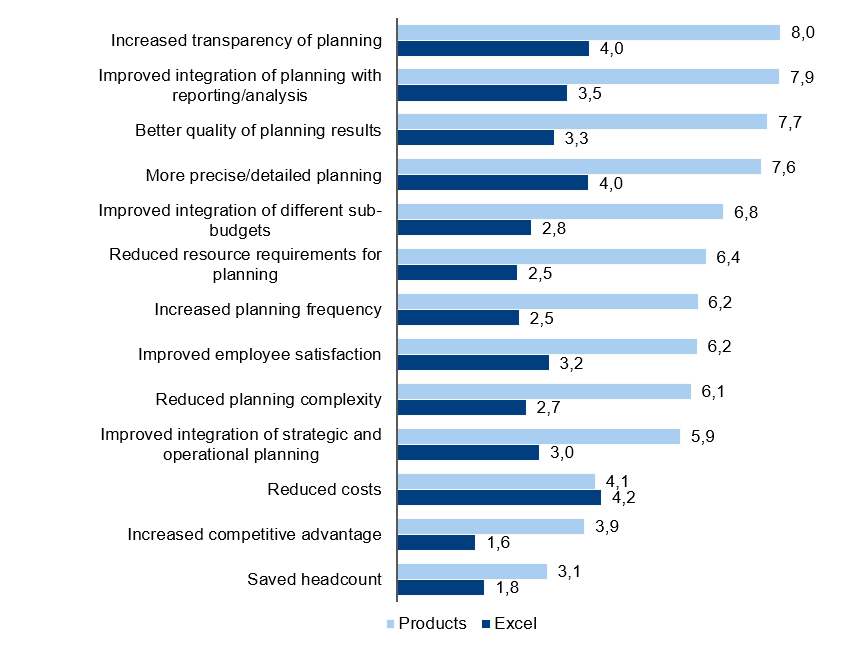
Planning comes around every year... (Part 3/3): The business benefits you can achieve with specialist planning solutions
In my last post, I highlighted the advantages and supporting functions that specialist software solutions offer for planning. In this third and concluding post, you will learn about the benefits companies are achieving through the use of specialist planning software tools.
In general, all planning solutions are used to achieve benefits in different areas and to make better decisions based on data. The "Business benefits" KPI used in BARC’s annual study "The Planning Survey" measures the benefits achieved through the use of specialist planning solutions. Figure 1 shows the most commonly achieved advantages are:
- Increased transparency of planning;
- Improved integration of planning with reporting/analysis;
- Better quality of planning results; and
- More precise/detailed planning
In contrast, benefits such as saved headcount, increased competitive advantage and reduced costs are rarely achieved, which is understandable. Even if the best planning products on the market are used, a high level of effort is still required and the tools can provide significant support, but not fully automate the process. That said, specialist planning solutions save a lot of time compared to other approaches, and the hours previously invested in manual tasks can be used for more productive, value-adding activities (e.g., scenario simulations, planning of measures, risk assessments).
In addition, Figure 1 emphatically shows that organizations using specialist planning solutions can achieve significantly greater benefits than those using Excel for planning tasks. This underlines once again that Excel is not suitable as a primary planning tool to support planning processes efficiently. Except for a reduction in costs, the benefits derived from using Excel for planning are always inferior. Even a superficial reduction of costs (primarily license costs) is likely to be "bought" expensively due to the increased manual effort and time spent on correcting errors.
In the future, it will be interesting to observe how current trends such as artificial intelligence and predictive planning can help to further automate planning and forecasting processes in order to relieve planners from manual and repetitive routine tasks.

Summary and recommendations
In volatile times, forward-looking planning and corporate management approaches are more important than ever. The use of specialist software solutions is essential for sustainable success in this context. In order to find and select a solution that fits your individual requirements, you should keep the following recommendations in mind:
- Define the goals of your planning and corporate management strategy in the digital age and determine its technical, functional and organizational elements.
- Carefully determine and weigh up your requirements for a specialist planning solution. Include all current and (where feasible) future users and, if possible, consider potential future requirements that could become relevant in the medium term.
- Based on your requirements, analyze the software market and create a short list of suitable solutions. Carry out a competitive evaluation of these solutions and test their performance in a typical scenario (proof of concept) in order to make an informed decision.
Taking this approach and the points highlighted above into account, nothing should stand in the way of successfully selecting a planning solution that meets your requirements.





